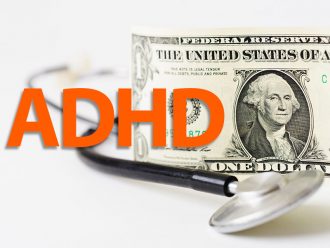Guest writer for Wake Up World
As someone diagnosed with ADHD, I believe the whole thing is a scam.
As far as I recall, I have always been considered extremely hyperactive. The most striking example is me, 22 months old, constantly riding my tricycle in the house. I used to manage my level of energy pretty well, but after entering school, my liberty to do so became increasingly restricted. My activity level then became a major struggle.
I’m 24 years old now, and I have spent most of my psychology degree studies investigating the causes of ADHD. I have the benefit of insight into both the body of research available and the mind of someone who is said to have ADHD. My readings and experience have both led me to a single conclusion: the concept of ADHD is nothing but a scam, a hoax perpetuated by Big Pharma and the psychiatric industry.
ADHD has no distinguishable brain abnormality.
This is the main reason why ADHD is a scam: the legitimizing factor is a total lie. No neurological abnormality has been found in people with ADHD. While farcical “scientific” figures have plagued social media, supposedly showing “the ADHD brain”, neuroscientists remain unable to identify ADHD with a brain scan. The popularity of the notion of a chemically imbalanced brain in people with ADHD serves to legitimize the cult of the chemically imbalanced brain. However, the brain of people with ADHD doesn’t legitimize anything, because there is no unifying neurological factor in people with ADHD.
There are no standards of “good” and “bad” brain chemistry or structure that can distinguish between normal controls and any psychiatric illness. Just as neuroscientists have no idea why people with ADHD respond so inconsistently to various types of medication, they are also completely unable to identify the neural bases of ADHD. The fact that psychoactive drugs can reduce hyperactivity doesn’t mean that they correct a chemical imbalance, they just create a new one, much like alcohol and shyness.
“None of the techniques reveal causal factors pertaining to the physiological underpinnings of ADHD; rather, the studies are relational in nature. These technologies currently lack adequate specificity and sensitivity for psychiatric conditions and therefore should not be used for informing clinical practice”. — Weyandt, Swentosky, & Godmundsdottir, 2013
The fact that ADHD has no biological marker doesn’t mean that the symptoms are imaginary, or that they aren’t debilitating. It means that the ADHD brain has not shown to be abnormal. Therefore, any policy or practice about ADHD should not pertain to assumptions about a globally dysfunctional brain, just the behavioral maladjustment and its contextual boundaries.
This reasoning doesn’t only apply to ADHD, however. In fact, schizophrenia, Alzheimer’s, or bipolar disorder can’t be identified by brain scans either. What is unique to ADHD, however, is that its symptoms of clinical severity radically vary from one context to another, within seconds.
Also see: The Fictions Surrounding ADHD and the “Chemical Imbalance” Theory of Mental Illness
ADHD symptoms are not universally impairing.
The concept of hyperactivity takes its meaning in relation to the environment. The level of activity (or arousal) of a certain organism depends on the surrounding stimuli. Those with ADHD are consistently under-aroused, and are constantly seek excitement and novelty. This explains why the symptoms of ADHD mainly emerge at work, or in the class room. People with ADHD can play video games for hours, yet struggle concentrating on work or chores for just a few minutes. It also explains why people with ADHD can make some very bad decisions — they don’t feel as impacted by consequences.
People with ADHD have a higher preferred level of arousal, and hyperactivity seeks to increase stimulus input. Their needs are entirely incompatible with the current education system that is probably the most un-stimulating environment that children had to experience in the history of mankind. School, daycare, homework, and even certain sports all have strict rules constantly restricting the liberties of children throughout the day. Many adults also struggle being inactive, but are at least granted more autonomy in and outside of work. People vary in their ability to tolerate boredom.
“When there is a discrepancy between the child’s level of arousal and level provided by the environment, the child will engage in instrumental responses in an attempt to provide optimal stimulus input for maintenance of alertness.” — Zentall & Zentall, 1983
Chronic boredom is prevalent in Western society because of the demands we are subjected to. We have the misfortune of being born in an era in which most jobs are only a combination of paperwork and computer work. In less advanced economies, where manual work is most important, those who can’t tolerate high stimuli environments are seen as impaired. Neuroscientists would probably easily find deviations from normality in them, too. Hyperactivity is only considered a disorder due to expectations of inactivity.
Nowhere in the human nature is it written that it is normal, or desirable, to be inactive for hours every day. Given all the health benefits of an active lifestyle, it is safe to assume that humans require a certain level of activity for optimal health — mental health included. If everyone with ADHD demanded longer breaks and more novelty at school or in the workplace, the organizations would adapt accordingly.
ADHD is a scam.
The concept of ADHD is a scam in the sense that psychiatrists do not understand the origins of the phenomenon. The functions that they cite as causing ADHD, may it be dopamine levels, prefrontal cortex activity, or impulse control, have no universal standards of normality, nor can they distinguish between people with and without ADHD.
Neuroscientists often refer to concepts that have absolutely no definition or normative data. Sensory processing disorder, a condition often co-morbid with ADHD, is a good example. It is nothing more than a meaningless buzzword. There are no established good or bad ways to process sensory information.
The ADHD phenomena is a special kind of scam, because most of the people involved personally gain from it. Everyone involved in the scheme of ADHD perpetuates its myths for their personal interests. Most diagnoses in children are requested by teachers and mothers because they are the ones experiencing the effects of the troublesome behavior. Rejecting the concept of ADHD makes them feel like they have not done their job, or that they are unable to show sufficient leadership.
Those who are diagnosed with ADHD perpetuate the myth that it is a disorder, in the objective sense, because it justifies measures they enjoy. They often think that rejecting the concept of ADHD implies that their symptoms are imaginary, and therefore, are the most radical proponents of the theory that their brains are abnormal and that they need medication. Also, the concept of ADHD prevents them from taking responsibility for many impulsivity mistakes or regrets. If you don’t subscribe to the medication cult of ADHD, chances are that you will be booted from most Internet ADHD communities.
Psychiatrists perpetuate the myth because they need to offer solutions to their distressed patients. The solutions they propose reveal the underlying motivations of the phenomenon. To manage elevated levels of energy, psychiatrists do not give free advice on sugar intake, daily activity, or coffee use — most of them are clueless about that. Meanwhile they know all kinds of psychoactive medications and the latest results of clinical trials — because that’s what people who pushed for a diagnosis benefit from.
Also see: Renowned Harvard Psychologist Says ADHD is Largely a Fraud
How I deal with it:
Since hyperactivity is clinically impairing only in settings with strict restrictions of space or instructions, I just avoid them altogether. Needless to say, I will probably not be a doctor or a physicist, but at least I do not experience severe adverse effects from my ADHD. Most affected people justify their use of medication based on the fact that they become able to concentrate “normally”. I personally just concentrate on things that I find easy to concentrate on. For example, avoiding flying into the bush while riding on my mountain bike. Or anything gym-related.
I’m basically doing what anyone else would be doing if psychoactive drugs didn’t exist for ADHD. I avoid periods of lengthy inactivity, and I’m constantly seeking novel experience.
I’m off to the water-park now — for the third time this week!
Also see: Chemical Lobotomy: The Mad Mass Prescription of Psychotropic Drugs
References:
- Weyandt, L., Swentosky, A., & Gudmundsdottir, B. G. (2013). Neuroimaging and ADHD: fMRI, PET, DTI findings, and methodological limitations. Developmental neuropsychology, 38(4), 211-225.
- Zentall, S. S., & Zentall, T. R. (1983). Optimal stimulation: a model of disordered activity and performance in normal and deviant children. Psychological bulletin, 94(3), 446-471.
About the author:
 Nicolas Kilsdonk currently resides in Groningen, the Netherlands. He enjoys mountain biking, working out, and playing very fast chess. He also enjoys very fast music.
Nicolas Kilsdonk currently resides in Groningen, the Netherlands. He enjoys mountain biking, working out, and playing very fast chess. He also enjoys very fast music.
You can follow Nicolas online at:
• Twitter: twitter.com/nkgervais
• Facebook: facebook.com/n.kilsdonk.gervais
• Website: nkilsdonkgervais.wordpress.com

If you've ever found value in our articles, we'd greatly appreciate your support by purchasing Mindful Meditation Techniques for Kids - A Practical Guide for Adults to Empower Kids with the Gift of Inner Peace and Resilience for Life.
In the spirit of mindfulness, we encourage you to choose the paperback version. Delve into its pages away from screen glare and notifications, allowing yourself to fully immerse in the transformative practices within. The physical book enriches the learning process and serves as a tangible commitment to mindfulness, easily shared among family and friends.
Over the past few years, Wake Up World has faced significant online censorship, impacting our financial ability to stay online. Instead of soliciting donations, we're exploring win-win solutions with our readers to remain financially viable. Moving into book publishing, we hope to secure ongoing funds to continue our mission. With over 8,500 articles published in the past 13 years, we are committed to keeping our content free and accessible to everyone, without resorting to a paywall.








